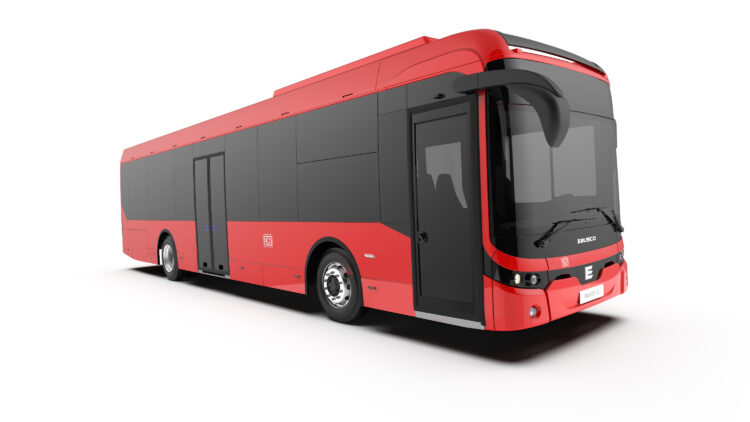For Ebusco, the past ten years have not only been about development but also about dispelling scepticism. And still, not everyone is equally aware of the possibilities with electric buses, sees founder Peter Bijvelds. “It is important to get in touch early. Then we can see what is really needed and what is possible. Sometimes, something is not asked for because people think it can’t be done.”
35,472,731 kilograms of CO2. In other words: the annual emissions of 1,775 Dutch households. That is the saving made by Ebusco vehicles since the first bus went to the road in 2013. “Buses are one of the biggest polluters of the inner city, driving around for more than ten years and coming back to the same place. You only have to put charging infrastructure in place once and then it’s done. In public transport, zero emission would go much faster. That is why I switched in 2010 from electric passenger cars to buses,” says Peter Bijvelds, who, with Ebusco, founded the first fully electric bus manufacturer in Europe in 2012.
On the eve of its tenth anniversary, Ebusco experienced a special year. 2021 was marked by the launch of its own factory in Deurne and an IPO on the Damrak. “After ten years of development, we are going to the masses.”
‘You are crazy’
In 2012, Bijvelds presented his first electric bus at the German trade fair IAA. “You’re completely crazy, they told me there. Your bus runs less than half as far as a diesel bus and costs twice as much,” he reflects in his office. “Green is nice as long as it does not affect the price”, he learned at the time. The number of vehicles sold in the first five years can be counted on three hands. This period was not only about dispelling scepticism, but also about innovating. “To ensure that the total cost of ownership (TCO) could compete with conventional diesel buses.
“The Ebusco 2.0 in 2015 was an important turning point. With the 2.0, we showed that electric buses are not just a nice project for there to be clean, but that you can also use them just as cost-effectively. We are now demonstrating that on a daily basis with the Ebusco 2.2” The real successor came in 2019 with the Ebusco 3.0, which is entirely manufactured in Deurne and whose hull is made of carbon fibre composite just like in the aviation industry. It ensures a much lighter vehicle, a greater mileage range and longer service life.
Data as proof
Transporters who still have doubts about the potential of electric buses can now more easily be proven wrong. Bijvelds opens the Ebusco Live monitoring system, in which all buses can be monitored in real-time. He demonstrates that there are buses that cover more than 500 kilometres in a day. “Those are now facts. Last year, nobody would have believed that we could do this. That has always been our gap.”
The Netherlands – “the most well-behaved kid in the class” – no longer needs to be convinced when it comes to zero emissions. “Here, the bus is already increasingly becoming part of the entire ecosystem. But abroad you still hear that they are jumping up and down when a bus reaches 200 kilometres. With this data, we can not only say it but also show it.”
Get in touch with people right on time
In the monitoring system, Bijvelds has now navigated to Germany, where he has found a bus that is only 60 per cent empty on most days. “This is also how we want to talk to transport companies. People ask for unlimited possibilities, such as diesel. But you also have to look at what you really need. If a customer says that buses must be able to travel 500 kilometres a day, perhaps only two of the hundred actually do so. That is why it is important to get in touch early.”
For this reason, Ebusco has already entered into partnerships with several carriers, which in turn helps the manufacturer to take the buses to the next level. “We want to talk to the market and think along with it before bidding for concessions. So that all the possibilities that are available are considered. Sometimes the state of the art technology from one or two years ago is still being considered, while our innovations are much more advanced by then.”
“We want to understand what is needed at an early stage. For example, that 13-metre buses are needed instead of 12, because four passengers will help a lot in the tender,” continues Bijvelds. “We can provide that kind of customization and it helps us to get to know the market better and to be able to think along with it. The thinking of a manufacturer and an operator is different. It is our challenge to really understand the needs of operators and to translate them into the best solution. That is why we employ many people with experience on the operational side.”
Other countries
From now on, Ebusco will also focus explicitly on other countries, now that the time for series production has come. “In the Netherlands, one in four buses is already electric. In the rest of Europe and America, there are big plans, but you see that they are still under 5 percent.” The manufacturer currently has branches in the Netherlands, Germany, France, China, North America and Australia.
If it were up to Bijvelds, there would soon be more. “The reason we went public was to ensure that we have local production capacity and personnel to respond to tenders. We now have the blueprint and have expanded the production method from a stable product. We are now going to expand that.”
 English
English  Nederlands
Nederlands  Deutsch
Deutsch  Français
Français  English (Australia)
English (Australia) 
